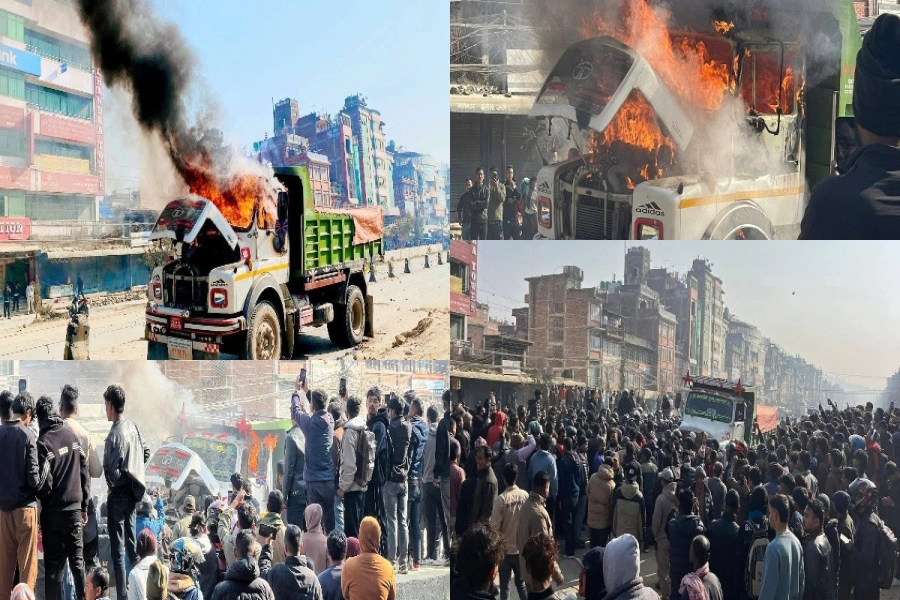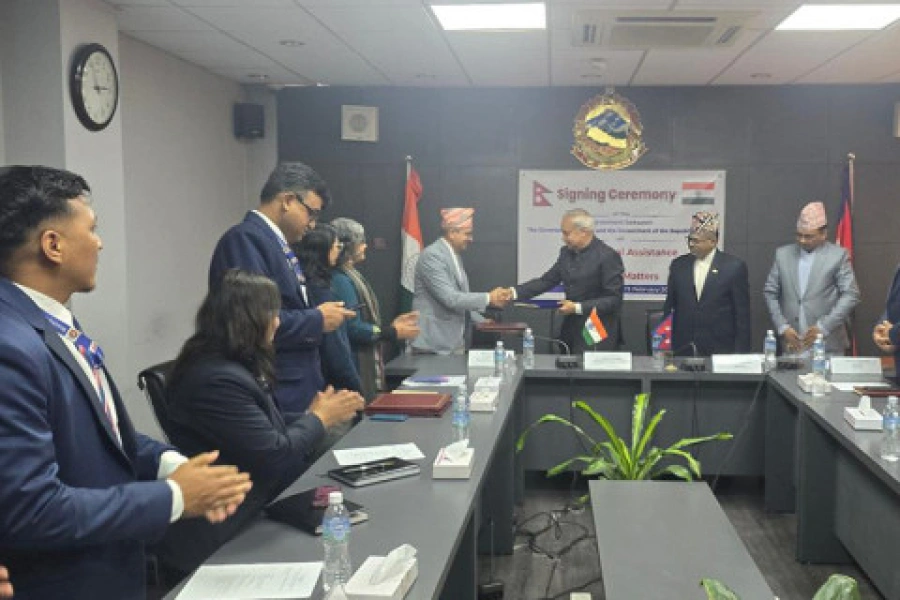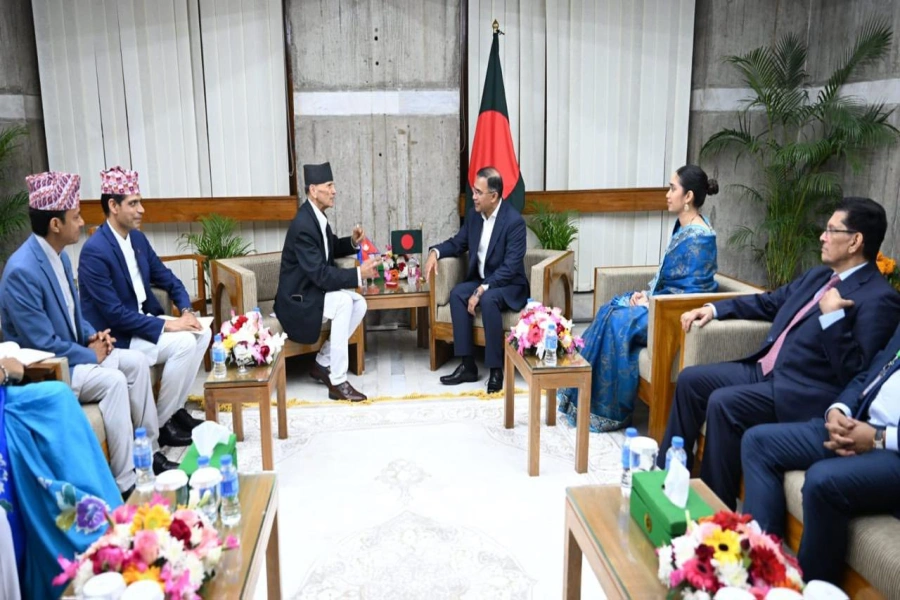KATHMANDU, Oct 6: As the general public reels under acute shortage of essential goods in the market with festive season just round the corner, the government has been widely criticized for not taking any serious initiatives to make alternative supply arrangements. Experts have also lambasted the government for failing to take effective diplomatic initiatives on time.
Foreign affairs experts and retired top bureaucrats accused the government leadership of failing to ease supply of essential goods even as it's been nearly two weeks since the depots of essential goods have dried up due to the blockade imposed by India.
REPUBLICA
KATHMANDU, Oct 5
As the general public reels under acute shortage of essential goods in the market with festive season just round the corner, the government has been widely criticized for not taking any serious initiatives to make alternative supply arrangements. Experts have also lambasted the government for failing to take effective diplomatic initiatives on time.
Foreign affairs experts and retired top bureaucrats accused the government leadership of failing to ease supply of essential goods even as it’s been nearly two weeks since the depots of essential goods have dried up due to the blockade imposed by India.
The prime minister and other leaders of major political parties have made various announcements with regard to addressing the crisis, but they haven’t been able to live up to their words.
Experts said leaders are found to be making announcements and giving speeches instead of making concerted efforts to find solution to the crisis.
A meeting of top leaders of three major political parties on September 25 announced, among other things, to send prime minister’s special envoy to India, who would meet Indian prime minister and other top officials in Delhi.
Since then, the supply from India has been further tightened but the government has neither deputed any special envoy nor has it been able to make the regular diplomatic efforts to bridge diplomatic lapses.
Recently, the Ministry of Foreign Affairs was devoid of leadership as the minister for foreign affairs, acting secretary at the ministry and prime minister’s foreign affairs advisor spent over a week abroad during the UN General Assembly.
Nepal’s former Ambassador to India Bhekh Bahadur Thapa found several shortcomings in taking serious initiatives by the government as through its diplomatic channels.
“Rigorous homework, deep analysis of the situation, meaningful talks and proactive and effective diplomacy are the urgent measures needed to be taken by Nepal side,” Thapa told Republica.
Former Chief Secretary Leelamani Paudyal finds political as well as bureaucratic failures in both foreseeing and managing the crisis.
“Political parties addressed the demands of Madhesi parties in the new constitution but the leaders failed to communicate the same to the general masses of Madhes,” Paudyal said. “Had the parties done so in time, the situation in border checkpoints wouldn’t have worsened as it has at present.”
He also criticized Nepali side for failing to tell the Indian authorities loud and clear that “they can’t violate the bilateral agreement, the way they did.”
Thirdly, he said that the ministry of supply should have maintained some additional stocks of petroleum products at the Nepal Oil Corporation (NOC). “The NOC is in profit for the last six months. So it could have made some additional stocks at its depots,” he said. “Had the NOC done so, we shouldn’t have faced this level of crisis.”
“This is a national crisis causing hardship for people across the country. So even prime minister should have directly talked to his counterpart and other political leaders should have accordingly made all-out efforts on their parts as well,” said a retired bureaucrat requesting anonymity. “But, we didn’t take any such initiatives except for giving public speech.”
It has been widely criticized that the government doesn’t have any policy at all to have a system of storing essential goods for certain duration so as to avoid such awkward political situation or any other disaster in the future. “This is a serious issue related to our national security as well,” said the retired bureaucrat. “But we in Nepal never took such a grave matter seriously.”
The prime minister and other leaders of major political parties have made various announcements with regard to addressing the crisis, but they haven't been able to live up to their words.
Experts said leaders are found to be making announcements and giving speeches instead of making concerted efforts to find solution to the crisis.
A meeting of top leaders of three major political parties on September 25 announced, among other things, to send prime minister's special envoy to India, who would meet Indian prime minister and other top officials in Delhi.
Since then, the supply from India has been further tightened but the government has neither deputed any special envoy nor has it been able to make the regular diplomatic efforts to bridge diplomatic lapses.
Recently, the Ministry of Foreign Affairs was devoid of leadership as the minister for foreign affairs, acting secretary at the ministry and prime minister's foreign affairs advisor spent over a week abroad during the UN General Assembly.
Nepal's former Ambassador to India Bhekh Bahadur Thapa found several shortcomings in taking serious initiatives by the government as through its diplomatic channels.
"Rigorous homework, deep analysis of the situation, meaningful talks and proactive and effective diplomacy are the urgent measures needed to be taken by Nepal side," Thapa told Republica.
Former Chief Secretary Leelamani Paudyal finds political as well as bureaucratic failures in both foreseeing and managing the crisis.
"Political parties addressed the demands of Madhesi parties in the new constitution but the leaders failed to communicate the same to the general masses of Madhes," Paudyal said. "Had the parties done so in time, the situation in border checkpoints wouldn't have worsened as it has at present."
He also criticized Nepali side for failing to tell the Indian authorities loud and clear that "they can't violate the bilateral agreement, the way they did."
Thirdly, he said that the ministry of supply should have maintained some additional stocks of petroleum products at the Nepal Oil Corporation (NOC). "The NOC is in profit for the last six months. So it could have made some additional stocks at its depots," he said. "Had the NOC done so, we shouldn't have faced this level of crisis."
"This is a national crisis causing hardship for people across the country. So even prime minister should have directly talked to his counterpart and other political leaders should have accordingly made all-out efforts on their parts as well," said a retired bureaucrat requesting anonymity. "But, we didn't take any such initiatives except for giving public speech."
It has been widely criticized that the government doesn't have any policy at all to have a system of storing essential goods for certain duration so as to avoid such awkward political situation or any other disaster in the future. "This is a serious issue related to our national security as well," said the retired bureaucrat. "But we in Nepal never took such a grave matter seriously."
Related story
Khotang administration, police criticized for failure to arrest...







































